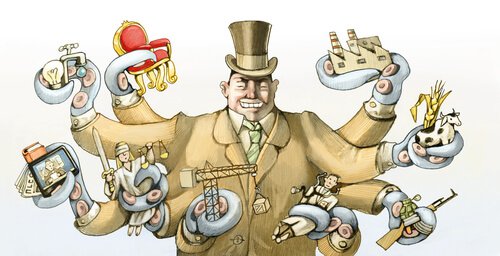From Selfishness to Self-Love According to Aristotle

Aristotle once said, “he wondered whether a man should love himself most or if it is better to love others.” This wise Greek philosopher postulated a unique vision on selfishness and its intimate relationship with self-love. What do you think about getting to know a bit more about his singular deduction?
Before continuing, we must state that we are going to focus on his famous work “Nicomachean Ethics.” To be more concrete, we are going straight to chapter VIII of the ninth book, which is entitled “On selfishness or self-love.”
Love for oneself or self-love according to Aristotle
Through this chapter of Aristotle’s extensive work, the philosopher deductively breaks down what he thinks a virtuous man must be like. In this work, the author focuses on the comparison between the love for oneself or self-love and selfishness.

This philosopher believes that the real facts contradict theories on selfishness. If indeed it is true that loving one’s best friend is virtuous, he also finds that we ourselves are the best friends we can have. That is to say that you are your best friend. So then, he wonders: is it selfish to love yourself? As is logical, the closest relationship that can be had in any person’s life is the relationship with himself. At the end of the day, who do we live with 24 hours a day and who do we have to put up with, no matter their mood?
The two kinds of selfishness that Aristotle stipulates
Once the philosopher establishes the precepts of self-love, he starts in on an explanation of the two meanings that he finds in selfishness. If indeed he believes that the term has a pejorative and shameful aspect to it, he also considers there to be a much more elevated variable.
The first kind of selfishness that Aristotle shows us is focused on the love of worldly things. The philosopher equates this sort of action with that of the village, that is to say, with the majority, which he calls the vulgar. This is without a doubt the result of an excessively classist society like the one that existed in Ancient Greece.
In this case, Aristotle identifies this first kind of selfishness as the most vivid worry over bodily pleasures. In other words, these people keep the greatest riches, honors, and goods for themselves. They demonstrate true devotion in accumulating material goods, and the more valuable it is, the better. That is to say that their only goal in life is to satisfy their passions and desires, which Aristotle considers to mean listening to the most irrational part of the soul. He observes this as a sort of vulgar custom, deplorable and very generalized. As such, it would be a reproachable attitude.
“The term self loving can be used as a criticism if a man takes more than his fair share of money, honor, and bodily pleasures for in this case he indulges his animal appetites and the irrational part of his nature.”
-Aristotle-
But later, this classical philosopher states that those men who were guided by the highest levels of justice and wisdom are also selfish. However, they are people who seek virtue, good work, and beauty. He sees nothing reproachable in this behavior.
Selfishness gives way to self-love
We want to continue by talking about this second kind of selfishness that Aristotle looks into. How can we not call a person selfish who dedicates himself, body and soul, to the search for wisdom, justice, and beauty? They also need to satisfy their own needs and this is their only goal in life.

Nevertheless, the philosopher attributes great value to these people. That is to say, he considers the good man the most selfish of all, but this selfishness is not harmful, but rather, noble. It is not vulgar, for reason is the master of him. It will never be passion, which is the case with the previously mentioned group, only focused on material goods.
According to Aristotle, these noble but selfish men focus their efforts on practicing virtue, for this is where delight is to be found. And this attitude ends up enriching the entire community. This is how they discover both personal benefit and service to others.
For the Greek philosopher, virtue is the highest of all goods that can be had. So while the virtuous man does what he has to and works intelligently and with great reason, the wicked man does it with profound discord between his duty and what he is really doing.
“The virtuous man will do many things on the behalf of his friends and his homeland.”
-Aristotle-
In conclusion
Here, it would be good to conclude that Aristotle finds the good and noble man to be selfish. But from his virtue and righteous behavior emerge gifts that his friends, his homeland, and his own community benefit from. He is a committed person who looks down upon material wealth, but enjoys the benefits of honor and dignity.
For a person like Aristotle, the upright man prefers to enjoy a second of pleasure to a life of indignity. He is generous and self-sacrificing when this is demanded of him. He will be capable of abandoning everything for those who need him. He will have no problem giving up the glory of an action to another person. That is to say that he is someone who knows how to be selfish and at the same time a person with elevated self-love.
This text is provided for informational purposes only and does not replace consultation with a professional. If in doubt, consult your specialist.








